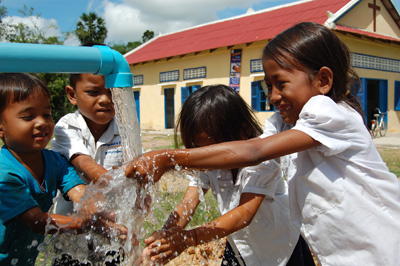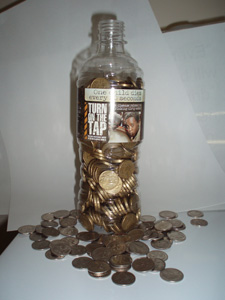
DAVID ADAMS reports on Samaritan’s Purse Australia’s Turn on the Tap initiative…
The statistics are startling: more 880 million people around the globe are forced to rely on what are potentially harmful sources of water resulting in what has been referred to as a “silent humanitarian crisis” which kills some 3,900 children every day.
Samaritan’s Purse ‘Turn on the Tap’ initiative aims to help turn the tide.
Officially launched in February,the project hopes to raise $500,000 to help bring clean water to communities throughout the Asia-Pacific region by World Water Day in March next year.

NOT TO BE TAKEN FROM GRANTED: Children enjoy this access to fresh water in Cambodia, one of the Asian nations Samaritan’s Purse is focusing on during its Turn on the Tap initiative.
“Cambodia has the highest rate of infant mortality for eastern Asia and the western Pacific region based on World Health Organisation statistics.”
– Darren Tosh, Samaritan’s Purse Australia
Darren Tosh, in charge of projects for Samaritan’s Purse Australia, explains that project is not just focused on water supply but also the quality of the water being provided.
“So we end up having two aspects…that we’re really focusing on: we’re sourcing water for communities that are currently dry or they currently don’t have great water access…and then, at the other end, we’re actually doing water filtration to address the quality issue. So it depends on the community.”
To that end, as part of the project, Samaritan’s Purse are looking to dig 145 wells in 29 different villages in Cambodia and to work to create rainwater catchment systems and community reservoirs.
They are also looking to raise enough funds to provide more than 2,000 water filters to communities in Cambodia, 1,000 in Burma and another 1,000 in Indonesia.
Mr Tosh says many communities need assistance in improving water quality, in particular in Cambodia where he lived for seven years.
“Cambodia has the highest rate of infant mortality for eastern Asia and the western Pacific region based on World Health Organisation statistics,” he says. “And that’s largely because children…due to some cultural traditions in the villages will often be given tea at a very young age – they’ll often get tea as the first liquid they end up consuming (and) often won’t get breastmilk.
“Sometimes the water in the tea is dirty and that actually infects the child right from the beginning so we end up seeing babies getting sick very very quickly in places like Cambodia simply because the quality of water is so very poor.”
Mr Tosh says that the problem with the tea is that while the water may be boiled, it’s often not boiled for long enough.
“The trick is it has to actually be a rolling boil, depending on who you talk to, for a minimum of five minutes – and I think the actual standards are closer to 10 minutes,” he says. “Most people when they’re making hot water for tea…typically take the kettle off the fire or the stove before it boils for too long. And so, if you’re not letting it go for a full roll of a boil, any of the parasites that actually have a hard shell are still going to be there when you end up consuming it. So you’re going get some of these really nasty parasitic infections.”
Samaritan’s Purse are also working in Burma (also known as Myanmar).
“We got some really exciting things happening there,” says Mr Tosh. “We’ve been able to work in some areas that we haven’t previously. Since Cyclone Nargis – when we had a very big relief operation there – we’ve been permitted to actually extend some of our programs in through the delta and areas that were affected to try and bring clean water there…So we’ve got really a good water filter program that’s happening in Myanmar.
“Basically what happens is that the village comes together – it depends on the location, but typically a dozen families get together on any given morning – and they actually build their water filters with the Samaritan’s Purse staff. They put in sweat equity – which is what we call it – and they also go through a training program. So they actually – in the following days – go home with the filter that they built. And those filters are incredibly effective, (causing) over a 98 per cent reduction in pathogens so that means that people are seeing a dramatic reduction in diarrhoea and disease.”
While Samaritan’s Purse are employed a range of technologies to improve water quality, Mr Tosh says treating water in family’s homes is among the most effective methods.

WATERY FUNDRAISER: Samaritan’s Purse say a 600 ml bottle filled with $2 coins will buy six water filters or two wells.
“It’s probably the most effective place to be treating water (is) at the point of use rather than trying to do some type of large, centralised program…” he says. “We’re finding that if we’re in people’s houses, we’re able to get to know the families, to get to know their needs, to understand their situation.”
He says technologies such as the BioSand water filter – a simple technology which imitates the natural filtering process which takes place when rain falls on the ground and is filtered through to the water table – are not only built by the community but use locally found materials, is robust and has a long lifespan.
Mr Tosh says having clean water affects all aspects of a family’s life.
“You actually see that kids end up going to school on a regular basis rather than being sick. Kids go to school because their parents aren’t sick. Often what happens is if the parents become ill then somebody has to stay home to be able to work the field or take care of the other kids or whatever it might be. Medical costs go down significantly and productivity, of course, goes up when you have healthy families.
“It’s all linked in terms of clean water and nutrition. So, when we end up talking about malnutrition being a huge issue among massive populations in South-East Asia…it’s not necessarily that there isn’t enough food in the country, it’s often that their bodies aren’t able to process the food properly – if you have chronic infections continually you’re not able to process the food and people become malnourished.”
Mr Tosh says water remains a key issue in any development project, both from an economic and a health perspective, particularly in countries where people are involved in subsistence farming. Not only, he says, is the rice-growing economy tied directly to the water but the health of families greatly impacts the economy.
As part of the initiative, Samaritan’s Purse have asked people to take a photo of their tap and email it to the organisation, with a sponsor donating $2 toward the campaign for every photo received.
They’re also encouraging people to fill a water bottle with gold coins.
“If you fill a bottle with gold coins, you’re able to give a water filter for six families or two wells…” says Mr Tosh. “It’s pretty amazing to think an old bottle of water filled with coins can give 40 or 50 people clean water for life.”
• To obtain a resource kit and to find out more details about the campaign, including how you can take a photo of your tap to raise money, visit www.turnonthetap.org.au. For more information about the work of Samaritan’s Purse visit www.samaritanspurse.org.au.





